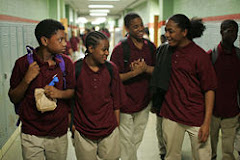The tall boy with the easy grin in the back row motioned me over. I walked over to his desk, and his hand continued to beckon. He wanted me to crouch down so he could whisper me something.
"Okay, I've got a problem, and, I have a solution," he whispered, with a sense of urgency.
We were in the middle of our summer reading quiz. He seemed to have his speech memorized.
"I didn't really do my summer reading. See, what had happened was, I got the assignment late, and then I had a real busy summer, and, you see, I, uh, don't read that well, and I just couldn't read the books that fast." (Note: "what had happened was" is perhaps my favorite piece of Baltimore youth dialect.)
His eyes averted my gaze when he gave me that last fact.
I nodded, waiting for his "solution" to the problem. As a rule, I kind of hate the way we do 9th grade summer reading, at leat a bit. Before the 9th grade, I've never met these kids; I don't know what level they're at. I don't even know if they receive or understand the assignment. I definitely want the kids reading in the summer, but hate many aspects of how we bring that goal about where I teach. I wish our 9th grade summer reading assignment were one long book the kids have to read (this year, it was three, two for English and one for Humanities), and wish we had a departmental policy about students who don't receive the assignment. I get resistance with both of these motions.
Ironically, I kind of find myself in charge of summer reading for my department, mostly because no one else seems to want to do it. See, I do like the idea of summer reading, and like what I hear other schools doing. And I love studying the Summer Reading table at Barnes & Noble. With this in mind, I do my best to make the task as palatable as I can for the kids within the system under which I teach. I have integrated choice into the summer reading novels, so now students at least get to choose much of what they read from a list. I have de-emphasized their importance during the school year, so kids don't automatically fail if they haven't read the books. I have, at least in my own classroom, brought some sort of flexibility in terms of late additions or derilect parents who don't go to spring orientation and don't make their kids go to Summer Bridge. Not the kid's fault, so I try not to make it irrevocably hurt them. One they are under my care at the school, I can hold them accountable for things they do not do, regardless of parental involvement (obviously some will have to work much harder because their parents are completely uninvolved, and I tell them that - that they must work harder), but find it very hard, and a bit immoral, to hold them accountable for summer work if they never receive it.
I've never been totally successful with making summer reading a totally educational sound entity at my school, but like a lot of the direction that it's heading. Basically, I want the kids reading and thinking over the summer. This year's participation is much better than last year's, so that's progress.
Anyhow, I looked down at the kid, waiting for his solution.
He had waited for the first part of his memorized speech to sink in.
"So, my solution, is that I'm going to work really hard this year, and make sure this never happens again. I'll make up these points by working ahead and doing any extra credit. And I promise you I'll always have my reading done from here on out."
I've never heard a better solution. He'll be a little behind after failing the little summer reading quizzes, but we start Fences on Wednesday and I'm sure he'll be into that.
Resep Masakan
11 years ago

2 comments:
What a great story - a mistake is turned into a learning opportunity. Even if he doesn't carry through 100% he knows what he needs to do to succeed. Now you've got me teary-eyed and the kids are all wondering what's the matter with me and giving me hugs...how embarrassing.
Kids like this are one of the reasons I miss being in the classroom.
Post a Comment